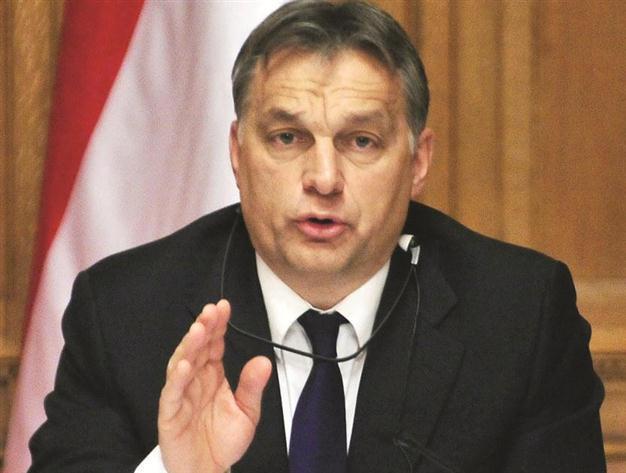Hungary abandons plan to merge central bank
BUDAPEST- Reuters

This move is the first concrete commitment since Orban made a broad pledge to the European Parliament earlier last week to back down on laws that have prompted charges he was seeking to take control of the countries’ major independent institutions. AFP photo
Hungary will abandon a planned merger of the central bank and its financial markets regulator, Prime Minister Viktor Orban said yesterday, backing down on one of the key points of conflict with the EU that threatens to block a deal on aid.The move is the first concrete commitment since Orban made a broad pledge to the European Parliament earlier this week to back down on laws that have prompted charges he was seeking to take control of the country’s major independent institutions.
The Hungarian forint rose around 1 percent and prices of Hungarian bonds surged on Jan. 17 and Jan. 18 on hopes the government was ready to reach a compromise that would open the way to a deal with the International Monetary Fund (IMF) and European Union.
But analysts were concerned that Orban, who has based his domestic political appeal on taking
Hungary on an independent course that would not bow to pressure from external parties like the IMF, might still be unwilling to deliver in practice.
“The government’s position must be formed at a government meeting, this happened Jan. 19 Orban told Hungarian radio. “Naturally, several laws may have to be modified, but the government cannot do it, this can be done only by parliament, and we will make proposals to this end.”
Expecting an agreement
Orban said he expected to strike a political agreement with European Commission President Jose Manuel Barroso on disputed legislation at a meeting next week.
He said it would have been beneficial for Hungary to have had a safety agreement with the IMF and the European Union already Jan. 19 even if the country had no plans to draw on any funding made available.
Orban’s Fidesz party has been criticized by the international community for introducing measures that threaten the independence of the media, the judiciary and the central bank since sweeping to power in 2010.
EU negotiators walked away from talks in December over some of the issues, prompting a fresh sell-off on Hungarian financial markets that threatened its ability to finance its public debt this year and prompted the U-turn by the government.
“If we take stock of the issues that have emerged, I do not see any particularly difficult
issues,” Orban said. “Regarding the central bank law, they questioned the merger of the central bank and (financial markets regulator) PSZAF (...) the easiest will be to abandon the merger of the two institutions. They have been operating separately and they will do fine separately in the future.”
The other major point of dispute over the central bank was the enlargement of its monetary policy council and the appointment of a third deputy governor by Orban.
The prime minister did not refer specifically to these issues, but said that with the exception of a row over a public sector pay cap that affects the bank “on all other issues I think we can come to an agreement.”
















